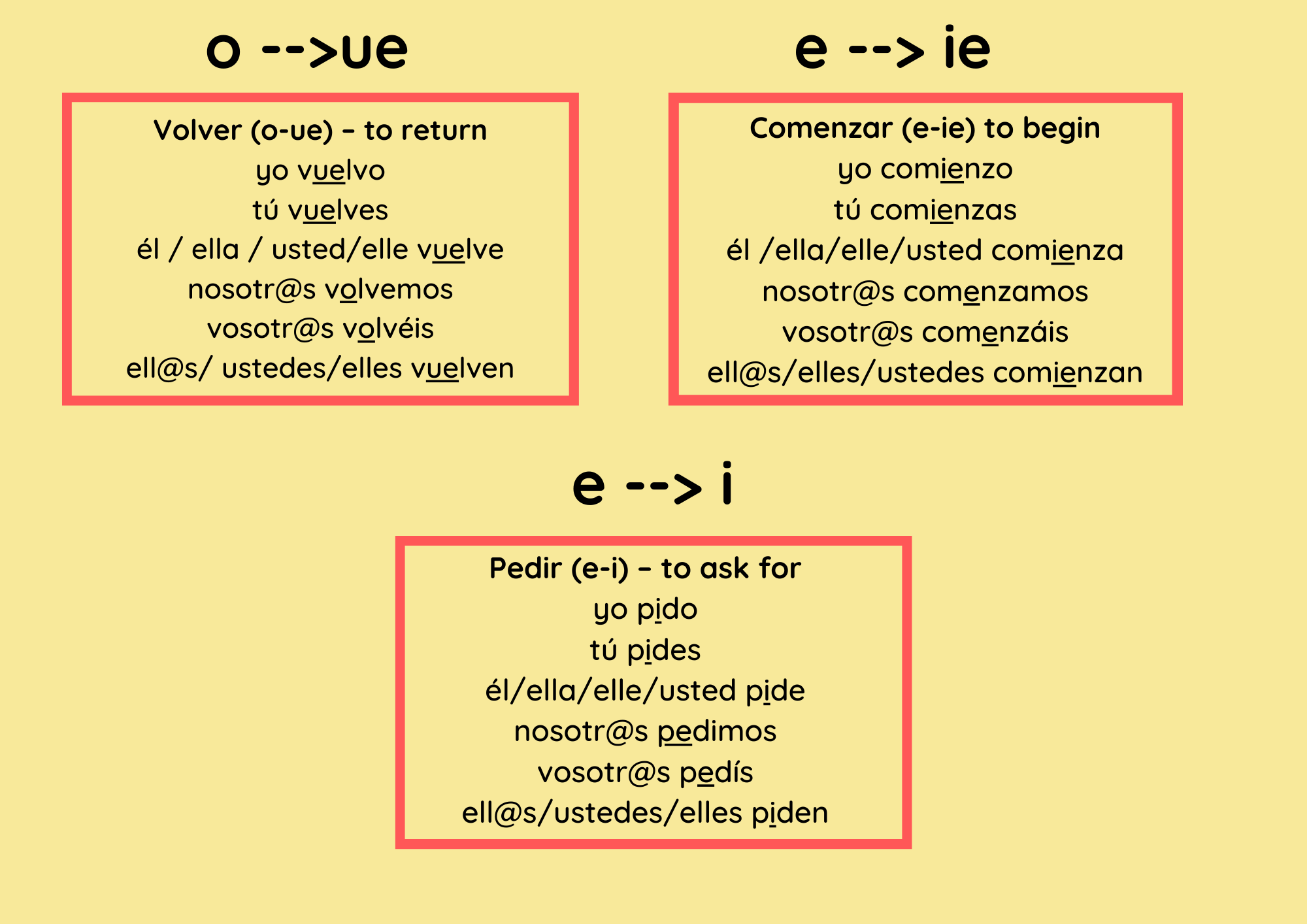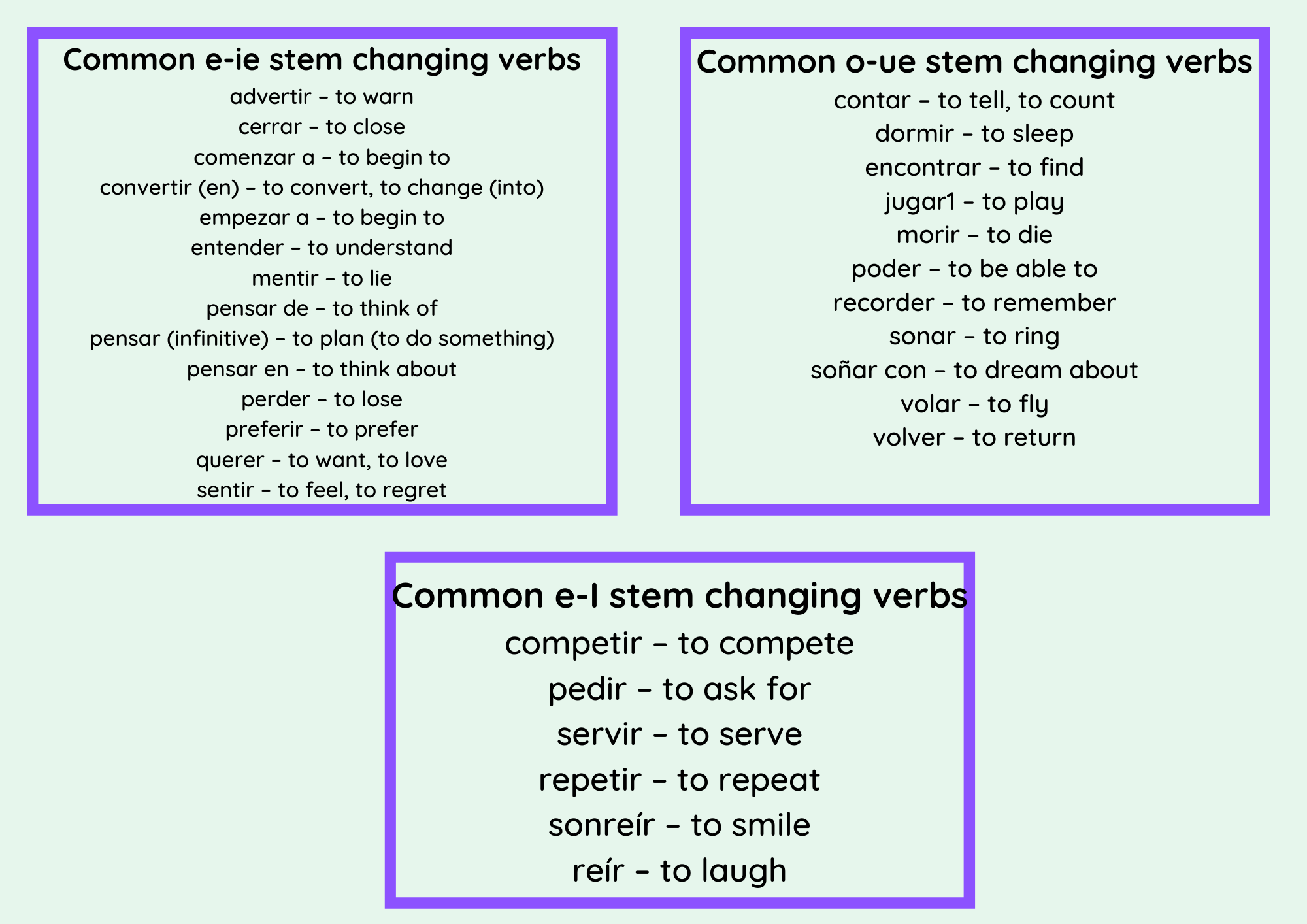41 Capítulo 4: Sección 7: Los verbos con cambio de raíz
Section Goal
In this section, students will learn how to discuss daily routines by using stem-changing verbs.
You have already learned how to conjugate verbs that end in -ar, -er, and -ir in the present indicative. The good news is that the endings you have already learned do not change. However, the stem to which you attach the endings does change in stem-changing verbs.
**There are three types of stem-changing verbs in the present indicative: o-ue, e-ie, and e-i**
Let’s start with the first, o-ue, and use volver (to return) as an example. When you conjugate this verb in the present, the endings will be the same as for other -er verbs (-o, -es, -e, -emos, -éis, -en), but the o changes to ue in all forms except nosotros and vosotros.
yo vuelo
tú vuelves
él/ella/usted vuelve
nosotr@s volvemos
vosotr@s volvéis
ell@s/ustedes vuelven
Draw a circle around the forms that stem-change (excluding nosotros and vosotros). Did you notice how the shape you drew looks like a shoe or boot? That’s why stem-changing verbs are sometimes called “boot” or “shoe” verbs. Feel free to draw laces on the shoe. (You know you want to.)


Note: In stem-changing verbs of more than two syllables, the vowel whose stem changes is in the next-to-last syllable. This applies to verbs in all three categories. Also, note that the verb jugar is u-ue instead of o-ue, but it follows the same pattern as o-ue verbs: juego, juegas, juega, jugamos, jugáis, juegan.
Actividad 36. Un diálogo
Instructions: Complete the following sentences with the correct form of the following verbs. Some of the verbs need to be kept in the infinitive form.
- Enrique: Ronaldo, voy al centro ahora.
- Ronaldo: ¿A qué hora __________(pensar/tú) volver? El partido (game) de Quidditch __________(empezar) a las dos.
- Enrique: __________(volver) a la una. __________(querer) ver el partido.
- Ronaldo: ¿__________(recordar) que (that) nuestro equipo (team) es muy bueno? ¡__________(poder) ganar!
- Enrique: No, __________ (pensar) que va a __________(perder). Los jugadores de Durmstrang son salvajes (wild) cuando __________ (jugar).
Actividad 37. Tu vida y la tecnología
Instructions: With two or three classmates, answer the following questions. Make sure to conjugate the verbs in parentheses.
- ¿Siempre (cerrar) sesión cuando terminas de usar CourseDen?
- ¿(Preferir) tú escribir a máquina o a mano (by hand)?
- ¿(Pensar) tú tuitear algo (something) esta noche?
- ¿(Sonar) tu teléfono mucho en clase?
- ¿(Querer) tú comprar unos audífonos nuevos?
Actividad 38. La vida universitaria
Instructions: Conjugate the verbs below in the tú form to ask your partner about their life in the university. Make sure to answer the questions in the yo form. Make note of what your partner says so that you can share with the class when you are done!
- ¿(Preferir) estudiar las humanidades, las ciencias sociales o las ciencias?
- ¿(Dormir) en un apartamento, una casa o una residencia estudiantil?
- ¿(Querer) dormir más? ¿Cuántas horas (dormir) normalmente durante el fin de semana? ¿Durante la semana?
- ¿(Jugar) deportes? ¿(Preferir) practicar deportes solo o con amigos?
- ¿(Sonreír) mucho en la clase de español? ¿Por qué o por qué no?
- ¿(Pensar) mucho en los estudios? ¿(Poder) imaginar tu futuro después de la graduación?

